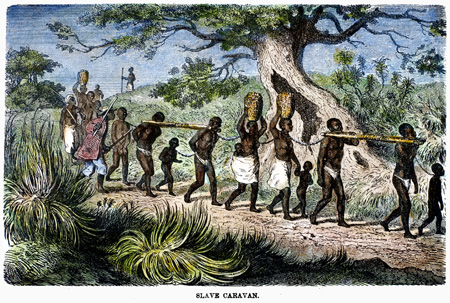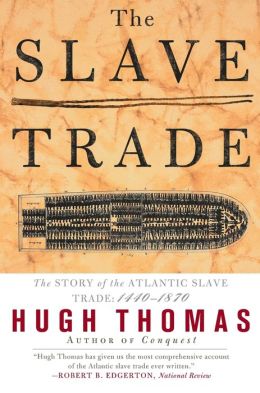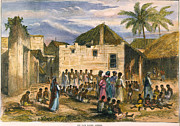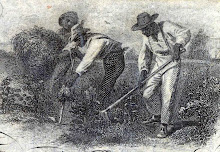 \
\
THE LEDGER OF A DEADLY BUSINESS: THE SLAVE TRADE
From Business Week, "The Ledger of a Deadly Business: The Slave Trade," by Hardy Green, on 24 November 1997 -- To Spain's conquistadores, the New World meant gold. But it was sugar as much as any other resource that tied Europe to the Americas. Sugarcane was introduced into the Caribbean before 1500--perhaps by Christopher Columbus. By the 1600s, even Europe's poor had found in sugar a source of calories and dietary variety, and by the late 1700s, it was an essential foodstuff. It stimulated debate in Parisian coffeehouses and wit in the drawing rooms of Versailles. In Britain and France, it became the most valuable single import, with the bulk coming from the West Indies and Brazil. And the production of sugar depended, of course, upon the trade of that other precious commodity, the African slave.
In fact, writes Hugh Thomas in his masterly and mammoth new book, The Slave Trade: The Story of the Atlantic Slave Trade, 1440-1870, ''most of the great enterprises of the first four hundred years of colonization owed much to African slaves.''

The Story of the Atlantic Slave Trade: 1440-1870; By Hugh Thomas
Thomas is a big-book man. The very simplicity of this British ex-professor's previous titles--World History, say, or The Spanish Civil War--indicates that they are offered as the last word on their subjects. The topic of slavery has, of course, received much prior attention, and Thomas particularly cites the works of historians Philip Curtin and David Brion Davis. But in this book, the focus is on the intricacies of the transatlantic commerce--its origins, methods, key players, and economics. With its uncompromising show of erudition drawn from a wealth of original and secondary sources, The Slave Trade is an indispensable account of a repugnant institution.
The story to which Thomas devotes 908 pages is as follows: Slavery is an ancient practice, integral to empires from the Egyptians to the Aztecs. But by the 11th century, for reasons that remain obscure, it had almost died out in Northern Europe. Slavery lived on, though, in all countries bordering the Mediterranean. And when Portuguese sailors began exploring the African coast in the mid-1400s, they returned home with enslaved Africans.
The idea of making slaves of prisoners was hardly original: Most recently, it had been a custom of both Christians and Moors during Iberian peninsula wars. Before long, though, the Portuguese began to buy slaves, setting up a model of trade that would last for centuries. African nobles or rulers, such as the King of Congo or the royal family of Dahomey, bartered humans they had kidnapped or captured in war for horses and European wares including cloth, metals, muskets, and alcohol.
Soon, the rest of Europe joined in: Spain, Holland, France, Scandinavia--and England, which by the early 1700s had become the preeminent slaver. By century's end, the trade ''seemed an essential part of the economies of all advanced countries,'' Thomas says, with 750,000 slaves being transported in one peak decade. Fueling the action was the New World's demand for labor--workers for Peruvian and Mexican mines, for Caribbean and Brazilian sugar and coffee plantations, and ultimately for North American rice, tobacco, and cotton fields.

Thomas is no moralist, and he keeps the finger-pointing to a minimum. Nevertheless, The Slave Trade answers many questions about individual and group involvement: Members of royal families from England to Spain to Benin were participants, and investors included such worthies as philosopher John Locke and Sir Isaac Newton. Although four popes condemned slavery, Catholic countries remained active, and the Jesuits were ''as deeply implicated as anyone.'' By the mid-1700s, the Quakers were becoming active opponents--perhaps the group most responsible for the trade's ultimate suppression. Few Northern European Jews participated, but much of the 16th and 17th century Portuguese and Spanish trade was financed, says the author, by converted Jews, or conversos.
Thomas even offers evidence for the superiority of free markets over state management. ''The Atlantic slave trade was, for much of its long life, a governmental enterprise,'' explains the author. States encouraged the establishment of companies that were then given or sold licenses to trade in slaves in Africa and to carry them to the New World. All such outfits, ''directed by half bureaucrats, half entrepreneurs,'' sought to fix the number of slaves to be carried along with the prices thereof. Governments collected taxes on the sales. But again and again, these monopolies proved financial failures. And ''in the end, it was recognized almost everywhere that private enterprise, with as few restrictions as possible, brought the best results''--a model pioneered by the U.S.

At times, though, Thomas goes too far. Frequent, sometimes conflicting tabulations of slaves transported may tire and confuse even careful readers. Knowing references to obscure figures abound: There's Juan de la Pezuela, for example, a captain-general of Cuba whose ''lifeless translation of the Divine Comedy had given him the nickname of 'El Danticida.''' Showy flashes of untranslated Latin and French are irksome.
Thomas concludes with a lengthy section on the rise of abolitionist sentiment and Britain's transformation from the world's most active slave trader to global antislavery policeman. In the 18th century, Bristol and Liverpool had been key slave-trading cities, and one-third of Manchester's manufactures had gone to Africa, principally as barter for slaves. By the 1780s, around 70,000 slaves a year were being transported from Africa, half of them in British ships. Nevertheless, ethical considerations--and a number of bloody slave uprisings--began to turn public opinion. Although the trade remained profitable, both the British Parliament and the U.S. Congress voted in 1807 to outlaw the transatlantic traffic, and France followed in 1818. (An internal market continued in the U.S. until the 1860s.)
Diplomacy and the work of the Royal Navy finally ended the international trade. British hauteur was much on display: Naval captains showed little regard for the sovereignty or property rights of others--boarding and searching ships on the high seas, attacking and destroying slave camps on the coast of Africa, and seizing and burning ships in Brazilian national waters. Explained Foreign Secretary Lord Palmerston: ''These half-civilised governments all require a dressing down every eight or ten years to keep them in order.'' In 1850, Brazil capitulated; Cuba, which by 1840 had become the richest colony in the world, producing twice as much sugar as Brazil, followed suit in 1870. But, the author tells us, slavery continued in both lands until the end of the 19th century.

What sustained Britain's crusade to stamp out the slave trade? At the time, many thought it a pretext for consolidating command of the seas. Thomas argues against this, attributing the policy's endurance to the political power of well-organized abolitionist committees and that of influential individuals, including Prime Minister William Pitt. And, it should be noted, the campaign never enjoyed universal support in Britain: In Parliament, free traders, among others, called it hypocritical, given Britain's commercial dependence on slave-harvested cotton and sugar. Nor did it prevent conservatives in government from cozying up to ''the cotton-producing and aristocratic South'' during the American Civil War.
In the 400-odd years of the trade, more than 11 million Africans had been enslaved and transported. Up to 20% died on the crossings, which lasted anywhere from one to nine months, and crews often fared no better. But, particularly in the 17th and 18th centuries, owners won fabulous profits, as much as 135% in one case cited by the author. For the slavers, ''sitting in their fine counting houses...men who never saw slaves'' or experienced their appalling ordeal, it was a sweet harvest indeed. (source: Business Week)


This was indeed an invaluable book of documentary history. Thomas had access to the Lisbon royal archives, and was able document the Portuguese groping their way down the African coast, year by year. And the British Royal Navy, whatever one thinks of colonialism, must count as one of humanity's greatest forces for good in the 19th Century, for doing so much to interdict the slave trade. You can even read the committee reports on how they proposed to go about abolishing slavery throughout their colonies.
ReplyDeleteImproving your home is one way of making it the most comfortable and clean place for you and your family to live in. It provides many benefits and one is, it can be a reasonable investment. Home improvement projects include repair and maintenance, energy efficient and security. Adobe Photoshop CC 2020
ReplyDeleteHeya i’m for the first time here. I found this board and I find It truly useful & it helped me out a lot. I hope to give something back and aid others like you helped me. driveworks 16
ReplyDeleteThe term 'global village' has been coined to aptly describe what technology (and information) has done to the world today. The manifestations of technology are too numerous to mention. Right now, we all breathe, eat, sleep, think and dream technology. It has thoroughly infused itself into our conscious self as well as our sub-conscious. The endless stream of information which it provides has illuminated our lives beyond comprehension. An attempt to understand technology leads to several riddles and enigmas. Simply put, most of technology's findings fill us with awe and are beyond understanding. An objective analysis of technology might be difficult because of individual differences. However, there has to be an attempt to answer this question. The million-dollar question that lingers on the minds of everybody. How has technology affected the modern man? cheapest software australia
ReplyDeleteINTRODUCTION - Perhaps I should start by asking the question "What is a Home Based Business? This is any business operated from the comfort of the residential home of the owner. whatsapp online girl mobile number
ReplyDeleteThis comment has been removed by the author.
ReplyDeleteIn this review, I will go into waist training as detailed as possible, based on my experience and my research. I will explain my experience, how it affected my daily life and what I have learned about waist trainers. I will talk about its positives and its negatives, and how it affected me personally. Body Shaping Underwear
ReplyDeleteI enjoy looking through and I conceive this website got some truly useful stuff on it! . 먹튀해방
ReplyDelete